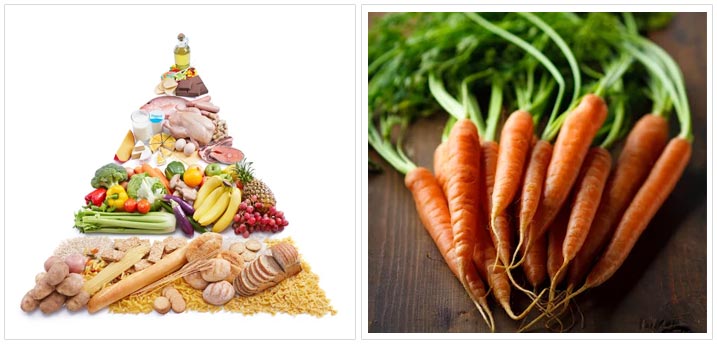Diet plays a very important role in management of diabetes as it exerts a direct influence on the blood glucose levels. Diabetes is a chronic disease, which occurs when the pancreas does not produce enough insulin or when the body cannot effectively use the insulin it produces. This leads to an increased concentration of glucose in the blood (hyperglycaemia). The Dietary guidelines as used in this review are sets of advisory statements that give quick dietary advice for the management of the diabetic population in order to promote overall nutritional well-being, glycemic control, and prevent or ameliorate diabetes-related complications.
Diet constitutes a crucial aspect of the overall management of diabetes which may involve diet alone, diet with oral hypoglycaemic drugs or diet with insulin. Diet is individualised depending on age, weight, occupation etc. The goals of diet therapy are to maintain a healthy and productive life. The amount and type of food consumed is a fundamental determinant of health. The diet should be varied to avoid monotony and provide a wider range of nutrients for healthy living. The total calorie intake for a normal individual with Typ 2 diabetes is approximately around 1400 calories per day. A proportion of this should be spent on regular physical activity every day. There is growing research evidence stating that calorie restriction coupled with physical exercise will enable one to manage their weight easily thereby leading to glucose control. The current recommendatons include3 main meals and 2 snacks during mid-morning and at tea-time.The dietary calories should be 60-70 % from Carbohydrates, 15 -20 % from proteins and 15-25 % from fat.The minimum amount of carbohydrate should be atleast 100 gm to prevent ketosis. Simple sugars like juices and sweets should be avoided since they are high in claories and glycaemic index. Complex carbohydrate and fibre should be included in the diet.
High protein intake helps to increase insulin production and promotes satiety. Pulses are rich in protein and fibre.Water soluble fibre has greatest hypoglycaemic and hypo - cholesterolemic effect. The diet should include legumes, whole grains and spices such as fenugreek seeds and cinnamon.A mixture of oils is preferred than single oil. Polyunsaturated fatty acids and monounsaturated fatty acids containing vegetable oils preferred (sunflower, corn, groundnut, gingelly oil) than animal fat and hydrogenated fat which contain more saturated fatty acids. Fish and chicken are preferred than red meat.

Three main meals and two between meal snacks can be taken.Patients should avoid fasting and feasting wher eever possible.Regular meals are needed for persons taking insulin. Timely intake and healthy snacks at regular intervals should be stressed to avoid hypoglycaemia.Patients treated with insulin or certain oral hypoglycaemic agents, e.g. Sulphonylureas, must be advised to eat regularly and not miss or delay their melas to prevent hypoglycaemia-three meals a day plus suitable snacks in between e.g. fresh fruit or snacks as advised by our nutritionist. In summary, any good healthy sensible diet would be suitable for a diabetic patients and no food has to be totally avoided for life.
1400 Calories Diabetic Diet
Morning
(6.00 - 7.00 a.m)
Breakfast
(8.00 - 9.00 a.m)
Mid - Morning
(10.30 - 11.00 a.m)
Lunch
(1.00 - 2.00 p.m)
Sambar, Rasam Vegetables - 1 cup, Salad - 1 cup, Green leafy - 1 cup
Whole grams - 1 k / day (Bengal gram / Green gram / Cow pea)
Skimmed curd - 1 cup / Buttermilk / Fish / Chicken - 100 gm (twice / week) / Egg white - 1 (daily)
Tea - Time
(4.00 - 5.00 p.m)
Dinner
(8.00 - 9.00 p.m)
Bed - Time
1 cup - 150ml | 1 katori - 180ml
Dietary suggestions::
- Avoid refined sugars as a part of your healthy diet for calorie control. This includes jaggery and honey.
- Sugar free supplements can be judiciously used as a part of healthy diet.
- Carrot, beetroot can be taken in moderate amounts, preferably as salads.
- Yam, potato, colocasia & root vegetables to be kept to a minimum quantity.
- It is healthy to take fruits than juices.
- Avoid butter, ghee, vanaspathi, fast foods & carbonated drinks.
- Low calorie / No added sugar juices can be taken infrequently.